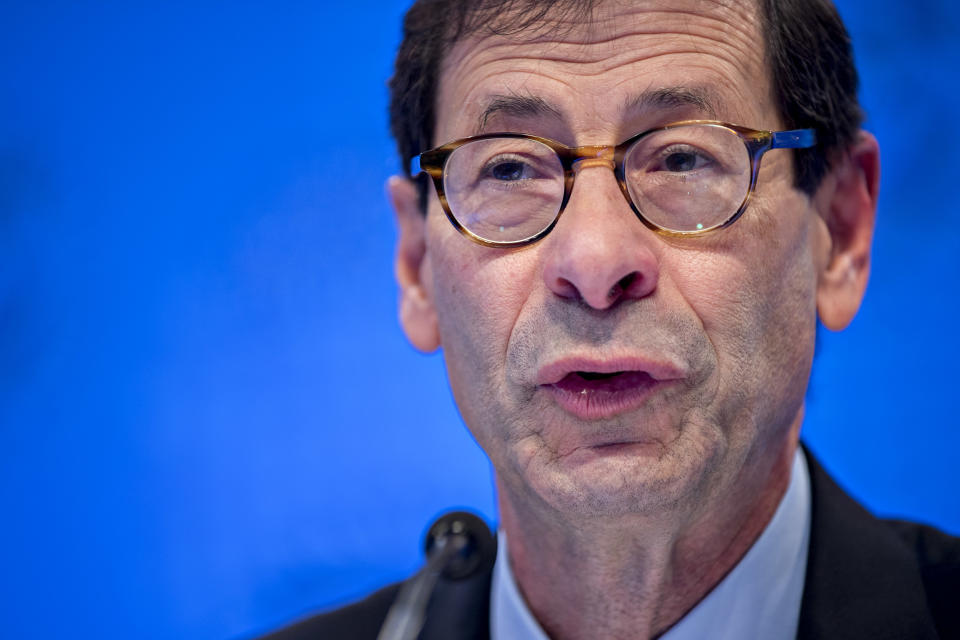4 things one of the world’s leading economists is worried about

The China-US trade war has occupied the world’s attention for the best part of 2018, but it’s far from the only issue deserving scrutiny, according to one of the world’s leading economists.
As he departs the International Monetary Fund, the outgoing chief economist Maurice Obstfeld has sounded the alarm on a number of global concerns.
1. Trade tensions (and leadership)
China and the US may spring to mind, but uncertainty over trade policy is also rampant surrounding Brexit negotiations.
Speaking in his final IMF global outlook report, Obstfeld said as trade uncertainties continue, financial conditions are also tightening for emerging market and developing economies.
This is also occurring as private and public debt around the world reaches record heights.
“With geopolitical tensions also relevant in several regions, we judge that, even for the near future, the possibility of unpleasant surprises outweighs the likelihood of unforeseen good news.”
But the sino-US trade tensions extend “way beyond” economics, and fundamentally to global leadership Obstfeld added.
“If you are a country like the United States, which has been a global leader and has shaped the global governance structure, how do you manage this relationship, which at once offers opportunities for cooperation but also hazards of conflict?
“Moreover, how do you do it dealing with a system that is very, very different from yours politically?”
He said he is unsure whether the current confrontational mode of negotiation is going to be productive as it feeds into the idea that one country has to “win”, rather than the belief that countries can coexist.
2. Wage growth and productivity
Advanced economies’ growth has trended downward since the mid-2000s as they’ve grappled with ageing workforces, Obstfeld observed.
And Australia’s current sluggish wage growth isn’t an anomaly either, with most advanced economies experiencing muted wage growth despite tightening labour markets.
The Reserve Bank of Australia explained last year how wage growth has been sluggish across advanced economies since the GFC, and the problem is that poor wage growth means lower spending. In Australia, household spending accounts for more than half the economy.
3. Education (not just the young, but the ageing workforce)
Advanced economies are asking themselves the same question: in a world where digital literacy is growing increasingly important, how do we harness the power of an ageing workforce?
It’s a question Obstfeld is asking as well.
“We need a big rethink on educational investments everywhere. Human capital investments very early in life have been shown to be critical to future success.
“But even later in life, they can promote greater flexibility of workers, prolong working lives, and offset effects of aging populations.”
4. Inequality
Populist politicians like Donald Trump and policies like Brexit have been fueled by a sense that the working class have been ignored and underserved.
While Obstfeld hopes improving education will remove the barriers to success for a greater number of people, he expressed concern over society’s fears that the global economy isn’t heading in the right direction.
“Clearly there are large segments of populations that feel that the sort of economic and political consensus that we thought we had reached by the early 2000s has not worked for them. They feel alienated from the elite power centers.”
He described it as a “critical, long-term problem” complemented by a failure of communication.
“There is now a sense in a lot of countries that incomes of working people have stagnated, that social mobility is lower, that opportunity is lower, that one’s children will not be better off and may indeed be worse off.
“These trends poison our politics.”
The solution? A policy shift.
Obstfeld said most investment should be directed towards improving labour market outcomes for young people, as that’s the easiest problem to solve.
Make your money work with Yahoo Finance’s daily newsletter. Sign up here and stay on top of the latest money, news and tech news.
Now read: Companies are desperate to find people with these 10 skills, according to LinkedIn
Now read: 14 business books everyone will be reading in 2019

 Yahoo Finance
Yahoo Finance 